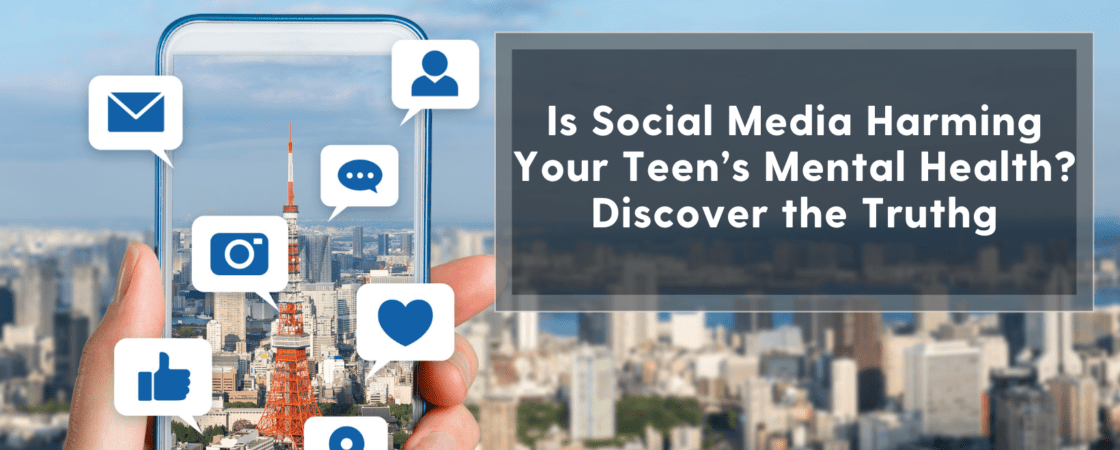Some Best Seller Mental Health Supplemsnts
In today’s digital age, social media has become an integral part of our lives, especially for teenagers. While it offers numerous benefits, such as staying connected with friends and accessing information, there is growing concern about its impact on mental health. This blog post delves into the potential harms of social media on teens’ mental health, backed by data and expert insights.
The Rise of Social Media and Its Ubiquity Among Teens
Social media platforms like Instagram, TikTok, and Snapchat have seen exponential growth over the past decade. According to a 2022 Pew Research Center survey, 95% of teens reported using social media, with a third stating they use it “almost constantly”. This widespread usage raises questions about its effects on young minds.
The Link Between Social Media and Mental Health
Several studies have highlighted the potential negative impact of social media on adolescents. A study by the American Psychological Association (APA) found that teens who spend more than three hours a day on social media are at a higher risk of experiencing mental health issues such as depression and anxiety. The constant exposure to idealized images and lifestyles can lead to feelings of inadequacy and low self-esteem.
The Role of Social Media in Sleep Disruption
One of the significant concerns is the impact of social media on sleep patterns. Teens often stay up late scrolling through their feeds, which can disrupt their sleep cycles. Poor sleep is closely linked to various mental health issues, including depression and anxiety. A study published in the Journal of Youth and Adolescence found that social media use before bedtime is associated with poorer sleep quality and higher levels of anxiety.
Cyberbullying and Its Psychological Effects
Cyberbullying is another critical issue associated with social media. Unlike traditional bullying, cyberbullying can occur 24/7 and reach a wider audience. Victims of cyberbullying often experience severe psychological distress, including depression, anxiety, and even suicidal thoughts. According to a report by the Cyberbullying Research Center, about 37% of teens have experienced cyberbullying at some point.
The Impact on Self-Esteem and Body Image
Social media platforms are rife with images of seemingly perfect bodies and lifestyles. For teens, who are in a critical stage of developing their self-identity, this can be particularly harmful. A study by the Royal Society for Public Health in the UK found that social media use is linked to increased body image concerns among young people. The pressure to conform to unrealistic beauty standards can lead to eating disorders and other mental health issues.
The Positive Side of Social Media
It’s essential to acknowledge that social media isn’t all bad. It can provide a sense of community and support, especially for teens who feel isolated in their offline lives. Platforms like Instagram and TikTok have communities that promote mental health awareness and provide resources for those struggling. Additionally, social media can be a valuable tool for self-expression and creativity.
Expert Opinions and Recommendations
Experts suggest that moderation is key when it comes to social media use. Dr. Vivek Murthy, the U.S. Surgeon General, has called for more research into the effects of social media on youth mental health. He recommends that parents set boundaries around social media use and encourage their teens to engage in offline activities.
How can parents help their teens navigate social media safely?
Helping teens navigate social media safely is crucial for their mental well-being. Here are some practical tips for parents:
- Set Clear Boundaries
- Time Limits: Encourage your teen to limit their social media use to a reasonable amount, such as no more than two hours a day.
- Device-Free Zones: Establish areas in the home where social media use is not allowed, like during family meals or in bedrooms at night.
- Promote Offline Activities
- Hobbies and Interests: Encourage your teen to engage in activities that don’t involve screens, such as sports, reading, or arts and crafts.
- Family Time: Spend quality time together as a family, which can help reduce the reliance on social media for entertainment and connection.
- Monitor and Discuss Content
- Stay Informed: Be aware of the platforms your teen is using and the content they are viewing.
- Open Communication: Maintain an open dialogue about their online experiences. Ask them about what they see and how it makes them feel.
- Educate About Online Safety
- Privacy Settings: Teach your teen how to use privacy settings to protect their personal information.
- Cyberbullying Awareness: Discuss the importance of reporting and blocking any form of cyberbullying.
- Model Healthy Behavior
- Lead by Example: Show your teen how to use social media responsibly by modeling good behavior yourself.
- Digital Detox: Take regular breaks from social media and encourage your teen to do the same.
- Encourage Critical Thinking
- Media Literacy: Teach your teen to critically evaluate the content they see online and understand that not everything is as it appears.
- Body Positivity: Discuss the unrealistic beauty standards often portrayed on social media and promote a healthy body image.
- Seek Professional Help if Needed
- Mental Health Support: If you notice signs of anxiety, depression, or other mental health issues, consider seeking help from a mental health professional.
By taking these steps, parents can help their teens develop a healthy relationship with social media and mitigate its potential negative effects.
How can schools address mental health issues among students?
Schools can play a pivotal role in addressing mental health issues among students through a combination of education, prevention, and intervention strategies. Here are some effective approaches:
- Mental Health Education
- Curriculum Integration: Incorporate mental health education into the school curriculum to raise awareness and reduce stigma. This can include lessons on emotional regulation, stress management, and recognizing mental health issues.
- Workshops and Seminars: Organize workshops and seminars for students, teachers, and parents to educate them about mental health and available resources.
- Early Identification and Intervention
- Screening Programs: Implement regular mental health screenings to identify students who may be at risk. Early identification can lead to timely intervention and support.
- Teacher Training: Train teachers to recognize signs of mental health issues and provide initial support. Teachers are often the first to notice changes in a student’s behavior or performance.
- Access to Mental Health Professionals
- School Counselors and Psychologists: Ensure that schools have adequate numbers of trained counselors and psychologists who can provide individual and group therapy sessions.
- Partnerships with Mental Health Organizations: Collaborate with local mental health organizations to provide additional resources and support for students.
- Creating a Supportive Environment
- Safe Spaces: Establish safe spaces within the school where students can go to relax and de-stress. These can be quiet rooms or areas with calming activities.
- Peer Support Programs: Develop peer support programs where students can talk to trained peers about their issues. Peer support can be very effective as students may feel more comfortable talking to someone their own age.
- Promoting a Positive School Climate
- Anti-Bullying Policies: Implement and enforce strict anti-bullying policies to create a safe and inclusive environment for all students.
- Positive Reinforcement: Encourage positive behavior through recognition and rewards. A positive school climate can significantly impact students’ mental well-being.
- Parental Involvement
- Parent Workshops: Conduct workshops for parents to educate them about mental health issues and how they can support their children.
- Regular Communication: Maintain regular communication with parents about their child’s progress and any concerns that may arise.
- Encouraging Physical Activity
- Physical Education: Promote regular physical activity through physical education classes and extracurricular sports. Exercise is known to have a positive impact on mental health.
- Mindfulness and Relaxation Techniques: Introduce mindfulness practices and relaxation techniques such as yoga and meditation to help students manage stress.
- Crisis Intervention Plans
- Crisis Teams: Establish crisis intervention teams that can respond quickly to mental health emergencies. These teams should include trained professionals who can provide immediate support.
- Clear Protocols: Develop clear protocols for handling mental health crises, including steps for referral to external mental health services if needed.
- Promoting Social and Emotional Learning (SEL)
- SEL Programs: Implement SEL programs that teach students skills such as empathy, self-awareness, and relationship-building. These skills are crucial for mental health and well-being.
- Regular Assessments: Conduct regular assessments to measure the effectiveness of SEL programs and make necessary adjustments.
- Utilizing Technology
- Telehealth Services: Provide access to telehealth services for students who may not be able to see a mental health professional in person.
- Mental Health Apps: Encourage the use of mental health apps that offer resources such as guided meditations, mood tracking, and coping strategies.
Conclusion
While social media has its benefits, it’s crucial to be aware of its potential harms, especially for teenagers. By understanding the risks and taking proactive steps, parents can help their teens navigate the digital world safely and healthily.
Frequently Asked Questions
How much time should my teen spend on social media daily?
It’s recommended that teens limit their social media use to no more than two hours a day to reduce the risk of negative mental health effects.
What are some signs that social media is affecting my teen’s mental health?
Look for changes in mood, sleep patterns, academic performance, and social interactions. Increased anxiety, depression, or withdrawal from offline activities can also be indicators
How can I monitor my teen’s social media use without invading their privacy?
Have open conversations about their online activities and set guidelines together. Use parental control tools to monitor usage time and ensure they understand the importance of privacy settings.
What should I do if my teen is being cyberbullied?
Encourage them to talk about their experience, report the bullying to the platform, and block the bully. Seek support from school counselors or mental health professionals if needed.
How can I help my teen develop a healthy body image despite social media pressures?
Discuss the unrealistic nature of many social media images and promote body positivity. Encourage them to follow accounts that promote healthy and realistic body standards.
What are some good offline activities to encourage my teen to reduce screen time?
Encourage hobbies like sports, reading, arts and crafts, or family activities. Engaging in these can help reduce reliance on social media for entertainment.
How can I teach my teen about online safety and privacy?
Educate them about the importance of privacy settings, not sharing personal information, and being cautious about who they interact with online. Regularly discuss online safety tips.
What are the benefits of social media for teens?
Social media can provide a sense of community, support, and a platform for self-expression and creativity. It can also be a valuable tool for staying connected with friends and accessing information.
How can I set a good example for my teen regarding social media use?
Model healthy social media habits by limiting your own screen time, taking regular digital detoxes, and engaging in offline activities. Show them how to use social media responsibly.
When should I seek professional help for my teen’s social media use?
If you notice significant changes in your teen’s behavior, mood, or mental health that you believe are linked to social media use, consider seeking help from a mental health professional.









